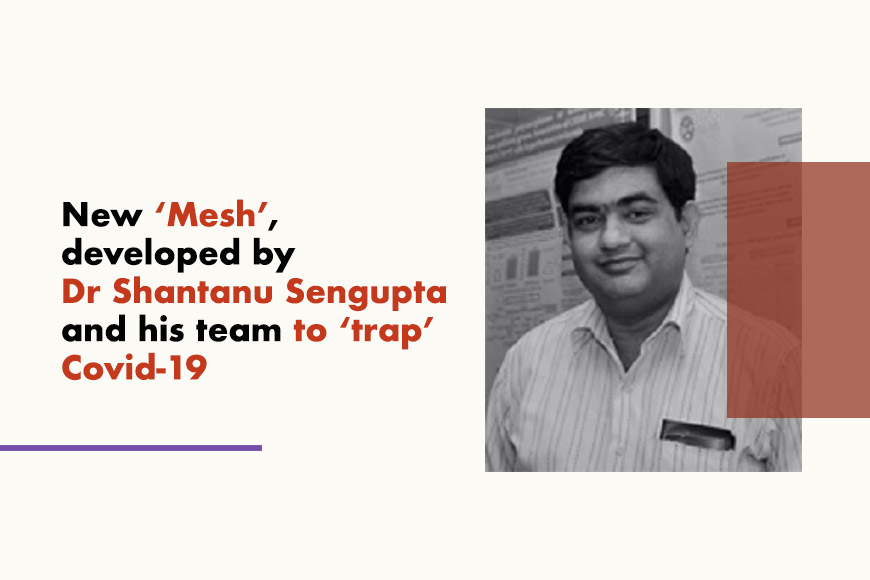New ‘Mesh’, developed by Dr Shantanu Sengupta and his team to ‘trap’ Covid-19

Coronavirus was for the first time identified in 1960 as a cause of common cold. By now we all know it is an enveloped RNA virus, single-stranded with a pleomorphic or spherical shape having projections of glycoprotein. It has various subtypes such as alpha, beta, gamma, and delta coronavirus along with serotypes of each subtype. The human coronavirus can also be found in bats, pigs, birds, cats, dogs, mice, and whales. Coronavirus can be transmitted through airborne droplets and the replication of the virus occurs in the ciliated epithelium that causes cell damage and inflammatory reactions at the site of infection. The milder cases of Covid -19 can include nasal congestion, sore throat, difficulty in breathing, chest pains, chills, kidney failure, and pneumonia. This virus can infect several organs in the human body, such as respiratory, hepatic, central nervous, and gastrointestinal systems. The rate of the outbreak of this emerging coronavirus is increasing alarmingly and current methods of diagnosis such as polymerase chain reaction (PCR) are not ideal as far as the cost-effectiveness, accuracy, and speed are concerned. Therefore, a faster and simpler method for the detection of viral infections can become a front-line tool in order to tackle the spread of this deadly disease.
A group of scientists working at the CSIR Institute of Genomics and Integrative Biology (CSIR-IGIB), New Delhi recently published a research paper in a renowned scientific journal where the scientists claimed to have found a faster and simpler method for the detection of Covid-19 infection and the success rate in this new method is far greater than the RT-PCR machine.
 Real-time polymerase chain reaction (RT-PCR) is used for the detection of Covid -19, which is time-consuming as sample preparation is required prior to analysis. PCR testing is a highly sensitive technique, 10 copies per reaction is the sensitivity that the researchers are relying upon, and false-negative tests can result in the failure of detection of Covid -19-infected patients. Therefore, the correct procedure for PCR is crucial. The initiation and development of several other molecular techniques to detect the quick and easy prevention and diagnosis of the Covid-19 outbreak are crucial to develop countermeasures.
Real-time polymerase chain reaction (RT-PCR) is used for the detection of Covid -19, which is time-consuming as sample preparation is required prior to analysis. PCR testing is a highly sensitive technique, 10 copies per reaction is the sensitivity that the researchers are relying upon, and false-negative tests can result in the failure of detection of Covid -19-infected patients. Therefore, the correct procedure for PCR is crucial. The initiation and development of several other molecular techniques to detect the quick and easy prevention and diagnosis of the Covid-19 outbreak are crucial to develop countermeasures.
In this new system, developed by Dr Shantanu Sengupta and his team, it is possible to ‘trap’ Covid-19 infection within two-and-a-half minutes by analyzing the nasal phlegm of the suspected patient. The success rate in this case is higher than RT-PCR machine. Dr Sengupta says, the system would be very effective in conducting tests in places like airports where it is necessary to complete the test and get reports quickly.
The system has been christened mass spectroscopy. Dr Sengupta explains the entire procedure of how the test is being conducted. The mucus from the subject is being dropped directly in ‘detergent.’ This ensures the extinction of the virus. So, this is also safe for those who are conducting the tests. After this, chemicals are used and then through centrifugation method, the protein is separated into nucleic acids or peptides and other biomolecules. After this, using mass spectrometer, detection of infection becomes easy. The entire process takes not more than two-and-a-half minutes. Others involved in this project include Professor Arjun Roy of Delhi’s Indraprastha (IP) Institute of Technology and Dr Sengupta’s assistant and scientist at IGIB, Dr Debasish Das.
Dr Sengupta said, they collected samples of suspected patients from the National Center for Disease Control and tested the samples in the mass spectrometer and the results showed positive although earlier when they were tested using the conventional RT-PCR machine, the results showed negative. During a second series of tests though, they were all found positive. But their mass spectrometer had already depicted the results as Covid positive. The scientists had downloaded 54 thousand strains and conducted tests on them. They claim the virus doesn’t mutate (as is the general perception now) and even if it does, it is easy to detect that.
A resident of Kolkata, Dr Sengupta spent his childhood and early years in Ichhapur in North 24 Parganas. He studied at Kendriya Vidyalaya (Central School) and after his Higher Secondary, joined Jadavpur University with honours in Chemistry. After completing his graduation and Masters from the varsity, he did his PhD from Indian Institute of Chemical Biology and moved to Delhi for his post-Doctoral research. Then he went abroad to further hone his skills. On his return to India, he joined IGIB and now he is engaged in fine-tuning a complete spectroscopic detection system that can be the next diagnostic tool in the war against Covid-19.









